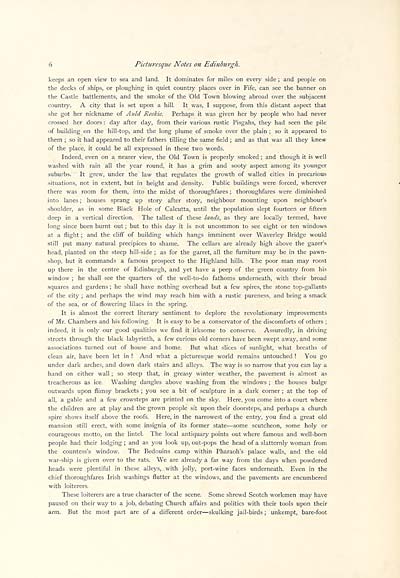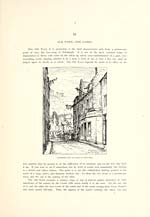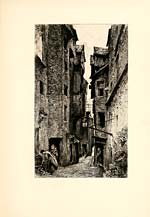Non-Fiction > Books > London, 1879 - Edinburgh
(20) Page 6
Thumbnail gallery: Grid view | List view

6 Picturesque Notes on Edinburgh.
keeps an open view to sea and land. It dominates for miles on every side ; and people on
the decks of ships, or ploughing in quiet country places over in Fife, can see the banner on
the Castle battlements, and the smoke of the Old Town blowing abroad over the subjacent
country. A city that is set upon a hill. It was, I suppose, from this distant aspect that
she got her nickname of Auld Reekie. Perhaps it was given her by people who had never
crossed her doors : day after day, from their various rustic Pisgahs, they had seen the pile
of building on the hill-top, and the long plume of smoke over the plain ; so it appeared to
them ; so it had appeared to their fathers tilling the same field ; and as that was all they knew
of the place, it could be all expressed in these two words.
Indeed, even on a nearer view, the Old Town is properly smoked ; and though it is well
washed with rain all the year round, it has a grim and sooty aspect among its younger
suburbs. It grew, under the law that regulates the growth of walled cities in precarious
situations, not in extent, but in height and density. Public buildings were forced, wherever
there was room for them, into the midst of thoroughfares ; thoroughfares were diminished
into lanes ; houses sprang up story after story, neighbour mounting upon neighbour's
shoulder, as in some Black Hole of Calcutta, until the population slept fourteen or fifteen
deep in a vertical direction. The tallest of these lands, as they are locally termed, have
long since been burnt out ; but to this day it is not uncommon to see eight or ten windows
at a flight ; and the cliff of building which hangs imminent over Waverley Bridge would
still put many natural precipices to shame. The cellars are already high above the gazer's
head, planted on the steep hill-side ; as for the garret, all the furniture may be in the pawn-
shop, but it commands a famous prospect to the Highland hills. The poor man may roost
up there in the centre of Edinburgh, and yet have a peep of the green country from his
window ; he shall see the quarters of the well-to-do fathoms underneath, with their broad
squares and gardens ; he shall have nothing overhead but a few spires, the stone top-gallants
of the city ; and perhaps the wind may reach him with a rustic pureness, and bring a smack
of the sea, or of flowering lilacs in the spring.
It is almost the correct literary sentiment to deplore the revolutionary improvements
of Mr. Chambers and his following. It is easy to be a conservator of the discomforts of others ;
indeed, it is only our good qualities we find it irksome to conserve. Assuredly, in driving
streets through the black labyrinth, a few curious old corners have been swept away, and some
associations turned out of house and home. But what slices of sunlight, what breaths of
clean air, have been let in ! And what a picturesque world remains untouched ! You go
under dark arches, and down dark stairs and alleys. The way is so narrow that you can lay a
hand on either wall ; so steep that, in greasy winter weather, the pavement is almost as
treacherous as ice. Washing dangles above washing from the windows ; the houses bulge
outwards upon flimsy brackets ; you see a bit of sculpture in a dark corner ; at the top of
all, a gable and a few crowsteps are printed on the sky. Here, you come into a court where
the children are at play and the grown people sit upon their doorsteps, and perhaps a church
spire shows itself above the roofs. Here, in the narrowest of the entry, you find a great old
mansion still erect, with some insignia of its former state — some scutcheon, some holy or
courageous motto, on the lintel. The local antiquary points out where famous and well-born
people had their lodging ; and as you look up, out-pops the head of a slatternly woman from
the countess's window. The Bedouins camp within Pharaoh's palace walls, and the old
war-ship is given over to the rats. We are already a far way from the days when powdered
heads were plentiful in these alleys, with jolly, port-wine faces underneath. Even in the
chief thoroughfares Irish washings flutter at the windows, and the pavements are encumbered
with loiterers.
These loiterers are a true character of the scene. Some shrewd Scotch workmen may have
paused on their way to a job, debating Church affairs and politics with their tools upon their
arm. But the most part are of a different order — skulking jail-birds ; unkempt, bare-foot
keeps an open view to sea and land. It dominates for miles on every side ; and people on
the decks of ships, or ploughing in quiet country places over in Fife, can see the banner on
the Castle battlements, and the smoke of the Old Town blowing abroad over the subjacent
country. A city that is set upon a hill. It was, I suppose, from this distant aspect that
she got her nickname of Auld Reekie. Perhaps it was given her by people who had never
crossed her doors : day after day, from their various rustic Pisgahs, they had seen the pile
of building on the hill-top, and the long plume of smoke over the plain ; so it appeared to
them ; so it had appeared to their fathers tilling the same field ; and as that was all they knew
of the place, it could be all expressed in these two words.
Indeed, even on a nearer view, the Old Town is properly smoked ; and though it is well
washed with rain all the year round, it has a grim and sooty aspect among its younger
suburbs. It grew, under the law that regulates the growth of walled cities in precarious
situations, not in extent, but in height and density. Public buildings were forced, wherever
there was room for them, into the midst of thoroughfares ; thoroughfares were diminished
into lanes ; houses sprang up story after story, neighbour mounting upon neighbour's
shoulder, as in some Black Hole of Calcutta, until the population slept fourteen or fifteen
deep in a vertical direction. The tallest of these lands, as they are locally termed, have
long since been burnt out ; but to this day it is not uncommon to see eight or ten windows
at a flight ; and the cliff of building which hangs imminent over Waverley Bridge would
still put many natural precipices to shame. The cellars are already high above the gazer's
head, planted on the steep hill-side ; as for the garret, all the furniture may be in the pawn-
shop, but it commands a famous prospect to the Highland hills. The poor man may roost
up there in the centre of Edinburgh, and yet have a peep of the green country from his
window ; he shall see the quarters of the well-to-do fathoms underneath, with their broad
squares and gardens ; he shall have nothing overhead but a few spires, the stone top-gallants
of the city ; and perhaps the wind may reach him with a rustic pureness, and bring a smack
of the sea, or of flowering lilacs in the spring.
It is almost the correct literary sentiment to deplore the revolutionary improvements
of Mr. Chambers and his following. It is easy to be a conservator of the discomforts of others ;
indeed, it is only our good qualities we find it irksome to conserve. Assuredly, in driving
streets through the black labyrinth, a few curious old corners have been swept away, and some
associations turned out of house and home. But what slices of sunlight, what breaths of
clean air, have been let in ! And what a picturesque world remains untouched ! You go
under dark arches, and down dark stairs and alleys. The way is so narrow that you can lay a
hand on either wall ; so steep that, in greasy winter weather, the pavement is almost as
treacherous as ice. Washing dangles above washing from the windows ; the houses bulge
outwards upon flimsy brackets ; you see a bit of sculpture in a dark corner ; at the top of
all, a gable and a few crowsteps are printed on the sky. Here, you come into a court where
the children are at play and the grown people sit upon their doorsteps, and perhaps a church
spire shows itself above the roofs. Here, in the narrowest of the entry, you find a great old
mansion still erect, with some insignia of its former state — some scutcheon, some holy or
courageous motto, on the lintel. The local antiquary points out where famous and well-born
people had their lodging ; and as you look up, out-pops the head of a slatternly woman from
the countess's window. The Bedouins camp within Pharaoh's palace walls, and the old
war-ship is given over to the rats. We are already a far way from the days when powdered
heads were plentiful in these alleys, with jolly, port-wine faces underneath. Even in the
chief thoroughfares Irish washings flutter at the windows, and the pavements are encumbered
with loiterers.
These loiterers are a true character of the scene. Some shrewd Scotch workmen may have
paused on their way to a job, debating Church affairs and politics with their tools upon their
arm. But the most part are of a different order — skulking jail-birds ; unkempt, bare-foot
Set display mode to: Large image | Transcription
Images and transcriptions on this page, including medium image downloads, may be used under the Creative Commons Attribution 4.0 International Licence unless otherwise stated. ![]()
| Early editions of Robert Louis Stevenson > Non-Fiction > Books > Edinburgh > (20) Page 6 |
|---|
| Permanent URL | https://digital.nls.uk/99396375 |
|---|
| Form / genre: |
Written and printed matter > Books |
|---|---|
| Dates / events: |
1879 [Date published] |
| Places: |
Europe >
United Kingdom >
Scotland >
Edinburgh >
Edinburgh
(inhabited place) [Place depicted] Europe > United Kingdom > England > Greater London > London (inhabited place) [Place published] |
| Subject / content: |
Capital cities Description |
| Person / organisation: |
Bough, Samuel, 1822-1878 [Artist] Seeley Jackson & Halliday [Publisher] Stevenson, Robert Louis, 1850-1894 [Author] Brunet-Debaines, A. (Alfred), 1845- [Etcher] Lockhart, William Ewart, 1846-1900 [Artist] Chalmers, Hector, 1849-1943 [Illustrator] Thomas, R. Kent (Robert Kent), 1816-1884 [Illustrator] |
| Person / organisation: |
Stevenson, Robert Louis, 1850-1894 [Author] |
|---|



